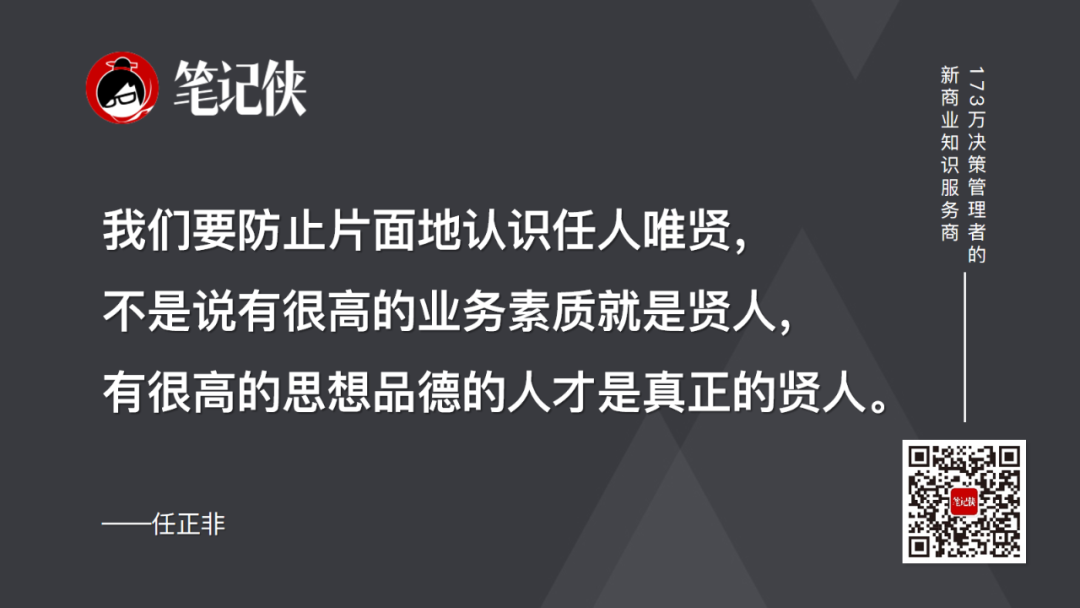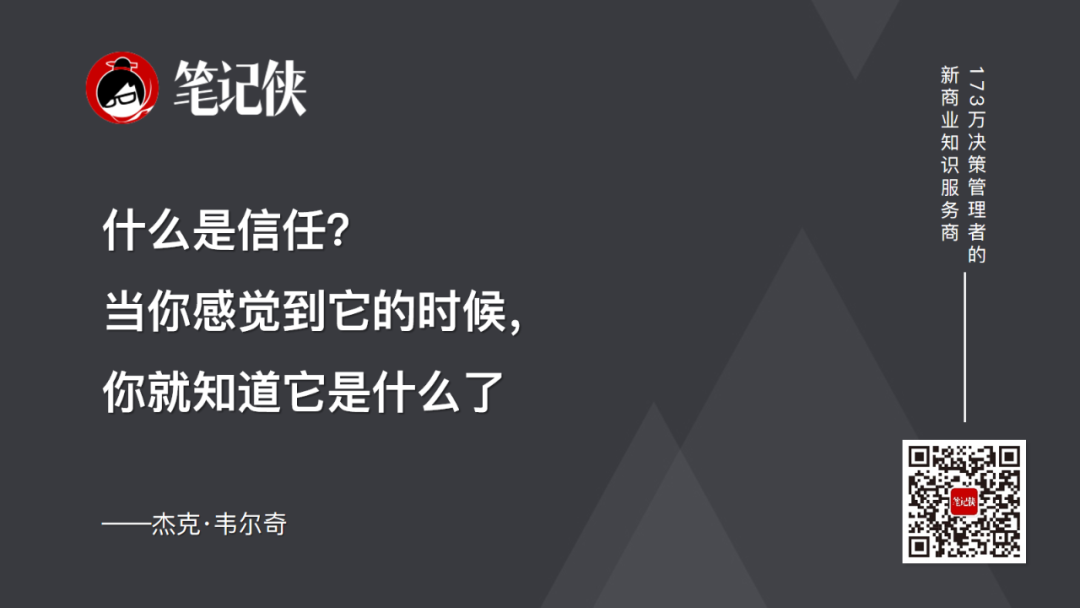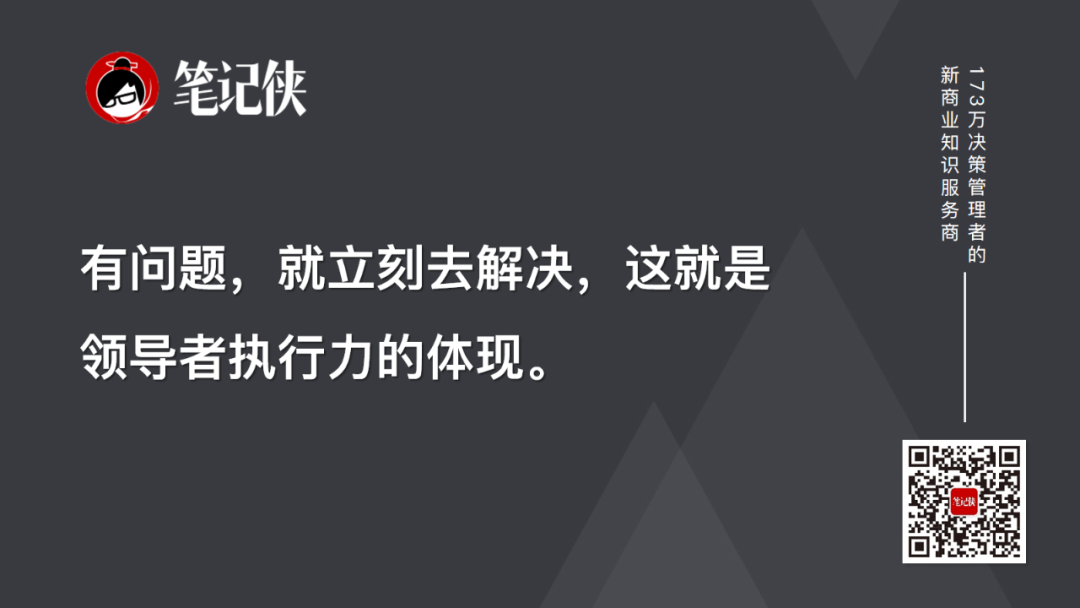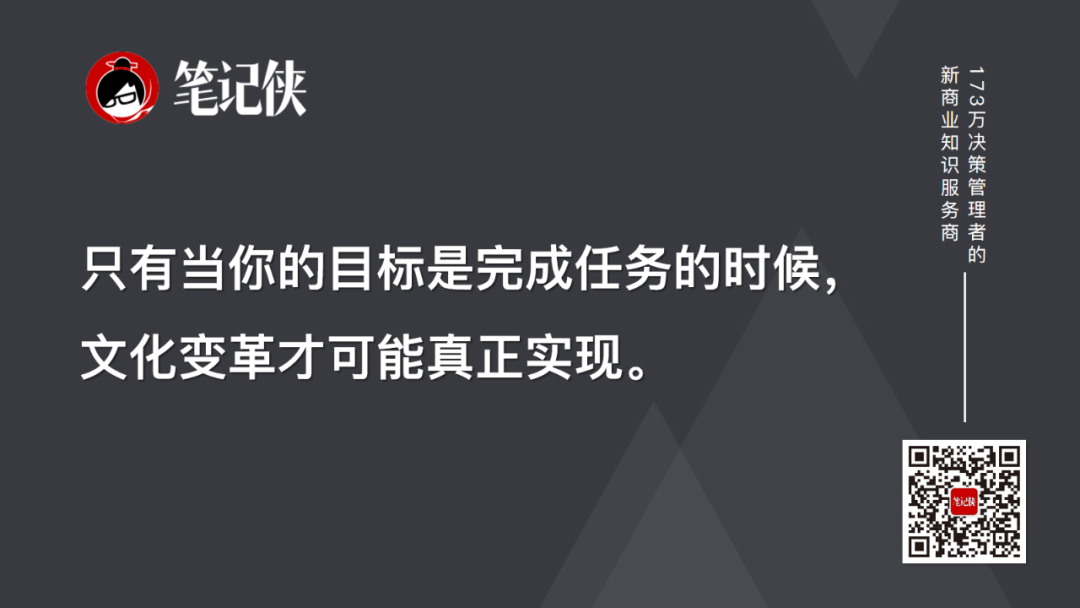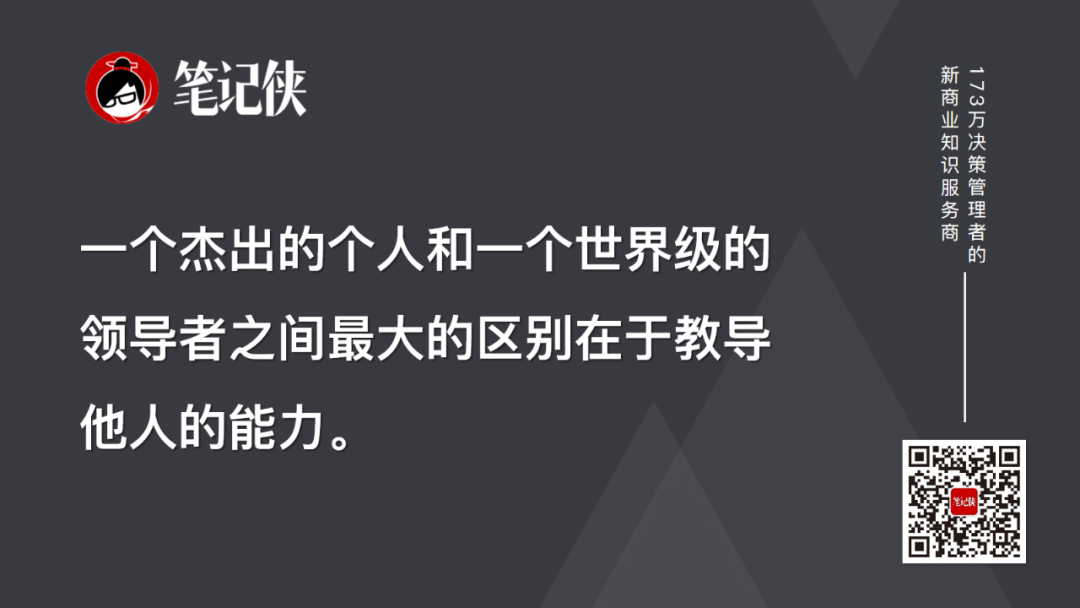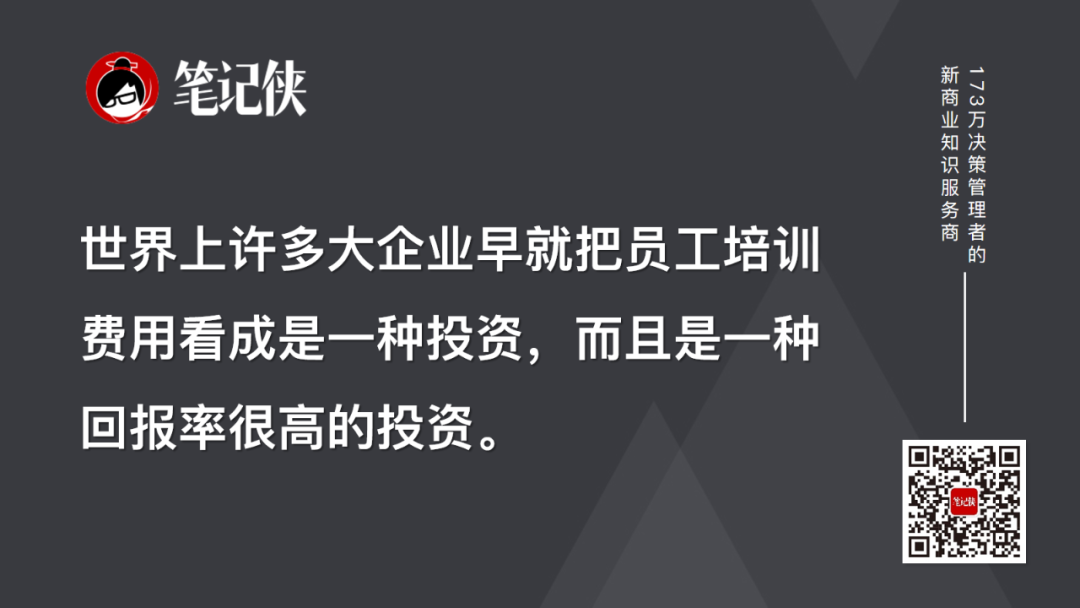Without understanding the management of people’s minds, there is no effect.
Editor’s note: This article is from the micro-channel public number “notes Man” (ID: Notesman), Author: Shepherd School.
Faced with the emergence of a large number of large and small, well-known and unknown companies from all walks of life around the world, it is too difficult for entrepreneurs in the 21st century to conquer cities.
So, leaders are racking their brains every day to think of ways to defeat the enemy. After much deliberation, it is still the word-people. Find people, choose people, train people, inspire people…
And the purpose of each action is only one-to make a group of people into a team; to cast a team into a “weapon”.
However, the sharp edge is not sharp, which is related to the leader himself.
First, cohesion is the strongest weapon of the team
The stronger the cohesion, the sharper the team.
Many leaders look forward to implanting cohesion into their teams through external intervention. However, cohesion is not a commodity on the shelf, it can be bought with money. Cohesion must be refined by the leader himself.
1. Without character, there is no cohesion
The leader is the leader of the team. A leader without morality can not bring out a cohesive team.
For leaders, noble character is the most basic element of leadership.
West Point Military Academy pays great attention to the cultivation of leaders’ moral character and writes it into its mission-to educate, train and motivate its students, so that every graduate can become a high- moral military leader.
The emphasis on morality by the West Point Military Academy is related to Robert Caslen, the 59th Principal of West Point Military Academy.
Before serving as the principal, West Point did not have a character course. After serving as the principal, Robert Caslen did one thing, which was to offer a moral course.
Robert Caslen said: “You can become the number one in your class and the number one in sports, but if you fail in character, you have failed in leadership.”
In Huawei, Ren Zhengfei puts moral character first in the selection criteria for cadres.
In Ren Zhengfei’s view: “We must prevent one-sided recognition of meritocracy. It does not mean that a person with high professional quality is a sage, but a person with a high ideological and moral character is a true sage.”
Huawei has three requirements for the moral character of cadres:
The spiritual level, including the sense of mission, professionalism, and dedication;
The cognitive layer includes a broad mind, global vision and structured thinking ability;
The behavioral level includes seeking truth from facts, self-discipline, self-criticism, and balanced development of management skills.
A person with integrity may not be successful, but a person with such shortcomings is not qualified to be a leader.
2. Trust is the cornerstone of cohesion
What is trust? Rather than give it a complicated definition, it is better to quote Jack Welch, the former CEO of General Electric. He said: “When you feel it, you know what it is.”
To put it simply, trust is confidence. The opposite of trust is distrust, and distrust is suspicion. When you trust someone, you have confidence in him, in his honesty, and in his abilities. When you don’t trust someone, you have doubts about him, doubt his honesty, doubt his plans, doubt his abilities, and doubt his experience. It’s that simple.
How important is trust to leaders?
is the top priority.
Trust is the foundation of leadership and the glue that unites the entire organization. A leader who breaks his trust time and time again cannot maintain his influence for a long time.
In a team, if the leader wants team members to trust them and colleagues trust each other, the leader must give trust.
In “Haidilao You Can’t Learn”, there is a description: In 2009, Haidilao Chairman Zhang Yong went to Peking University to teach graduate students in business administration. A student asked: If every waiter is exempt Single power, will anyone abuse their power to free their relatives and friends?
Zhang Yong did not answer directly, but instead asked him: If I gave you this power, would you?
There are more than 200 students in the classroom, and there is silence.
Employees will move closer to the leader they trust. And every action taken by the leader is a powerful way to build trust.
3. Communication is the lubricant of cohesion
Effective communication is the key to successful leadership. Especially when superiors treat subordinates and communicate well, they can form invincible cohesion, combat effectiveness, and creativity.
Sam Walton, the former president of Wal-Mart, said: “If you have to condense the Wal-Mart systemTo become a thought, that may be communication, because it is one of the real keys to our success. We communicate in many ways, from Saturday morning meetings to extremely simple telephone conversations, and even satellite systems. The need for good communication in such a large company cannot be overemphasized. “
A good leader is generally a good communicator.
In fact, no matter where in the world, managers have the habit of understanding the status of team members and discovering team problems through gossip. In the final analysis, this habit is hoping to eliminate the problem through communication.
If you want to become a cohesive team, communication plays a role in clearing the obstacles that affect cohesion, and it is especially worthy of leaders’ attention and use.
Second, execution is the core weapon of the team
The stronger the execution team, the more open it is.
Leaders want their team to be a strong execution team. However, many leaders themselves are giants of thought and dwarfs of action.
1. Execution should be the most important ability of a leader
A leader who delegates all the execution to his subordinates can hardly bring out a team with strong execution.
In the eyes of employees, Musk is an executive leader.
Employees once commented on him: work is blocked or inter-departmental orders are blocked. Elon’s words are “Call me anytime if you have a problem, I don’t care what the problem is, I want Fix it now.”
If there is a problem, solve it immediately. This is a manifestation of the executive ability of the leader.
Vanke President Yu Liang will not let Vanke colleagues read the book on execution. Yu Liang said: “The concept of execution is a convenient way for superiors to shirk responsibilities to subordinates.”
Ma Yun once said: Employees come to the company for two things, one is to make money, and the other is to grow! There are only two reasons for employees to leave, either because the money is not available, or because they are not happy! There are only two reasons for the inability of employees to execute, either the leadership is incompetent or the system is incompetent!
Execution is the bridge between goals and results. In this sense, execution should be the main job of a leader.
As a leader, if you don’t know how to execute, all your work will fail to achieve the expected results.
2. The behavior of the leader will eventually become the behavior of the team
The team’s execution is not enough, and the leader has to find the reason from himself.
For companies, the behavior of leaders is the foundation of the entire corporate culture. The team’s execution is not enough, and the leader must find the reason in his own behavior.
But the reality is that when a business goes wrong, the leader’s first reaction is usually to change the corporate culture. However, whether it is a strategic change or structural adjustment, the improvements brought to the enterprise are limited.
Why are improvements limited?
Ram Charan believes that the company lacks an executive culture.
How do leaders establish an executive culture within the company?
First of all, a leader must recognize a very simple premise: only when your goal is to complete the task, cultural change can be truly achieved.
There is no need for leaders to research any complicated theories or conduct any tedious employee surveys in advance. What the leader needs to do is to change the behavior of employees that can directly affect the efficiency of the company.
First, the leader should clearly tell employees what the company’s goals are, and then discuss with everyone the conditions that should be met to achieve these goals, and use it as an important part of the guiding process.
After a period of time, leaders should reward those who have made contributions; if they do not achieve their predetermined goals, you should give them more coaching, cancel rewards, change jobs, or let them go away. In this process, you have actually established an executive culture for your company.
3. What exactly should the leader responsible for execution do?
Ram Charan once mentioned that seven basic behaviors are the first element of execution:
① Comprehensive and in-depth understanding of the company and employees
Whether it’s business operations or strategy formulation, leaders must go deep into reality, don’t make superficial articles or superficial issues, use numbers to speak, use logical reasoning, and use questions to inspire.
② Seek truth from facts
Listen to it. Leaders must walk into the scene to solve substantive problems.
③ Set clear goals and prioritize them
Focus on important targets, not beard and eyebrows.
④ Continue to follow up untilGoal achieved
After each meeting, it’s best to develop a clear follow-up plan: what is the goal, who is responsible for this task, when to complete it, how to complete it, what resources need to be used, and the next project schedule Discuss when and how to proceed, and who will participate.
⑤ The rewards and punishments are clear, and the outstanding performance personnel are highly rewarded
Jack Welch said that it is not difficult to do a good job in an enterprise. The key is to continuously raise salaries for 20% of outstanding employees, and continuously eliminate 10% of backward employees. Your most important job is not to turn the worst employees into good performers, but to turn good performers into the best.
Find excellent managers, give them enough resources and powers, and let them give full play; promote and reward your best employees, give them incredible salaries, and let them run the business for you; no hesitation To get rid of unqualified managers, they should go to a company that can give full play to their characteristics.
⑥ Improve subordinates’ ability through coaching
The biggest difference between an outstanding individual and a world-class leader is the ability to teach others. Leaders must not only have internal knowledge, but also be able to communicate this knowledge so that others can understand and promote their growth.
Future success is the ultimate criterion for judging the success of a leader. If you are a successful leader, the thing you should remember is how many successors you have trained.
⑦ Understand yourself and show a brave, decisive, and pragmatic character
Ram Charan said that once a leader develops these behavioral abilities, he can make unlimited self-improvements and improve his abilities.
All this is undoubtedly the best choice for leaders.
Three, talent investment is the ultimate weapon of the team
The more talented the team, the more invincible the team.
1. Invest first, then harvest
It is self-evident that Ren Zhengfei attaches great importance to talents.
It is said that Huawei pays 300 million yuan a day, and most of this money is distributed to technology talents.
Huawei, which is very willing to spend money on research and development, has become the world’s 5G leader.
This just confirms Ren Zhengfei’s words, “Bold talent investment, harvest is a matter of time.”
Look at Ali again.
In 2017, Alibaba announced the establishment of a global research institute-Alibaba Dharma Academy, and invested 100 billion yuan in 3 years to attract talents.
Zhang Yong, Peng Lei, Jing Xiandong, Jiang Fan, Fan Luyuan, Tong Wenhong… Among Internet companies, who else can have so many talents?
2. Build a talent management mechanism
Ren Zhengfei once said: “Talents are not Huawei’s core competitiveness; the ability to effectively manage talents is the core competitiveness of an enterprise.”
Ren Zhengfei has always attached great importance to the organizational system and personnel training.
In 2012, Ren Zhengfei said at a retreat at Huawei: “We have only two wealth left to the company: one is our management structure, process and IT-supported management system, and the other is human management and incentive mechanisms. People will go, and they will die if they don’t go, and the mechanism is inanimate. This inanimate management system is a huge wealth for the next hundred years and millennia. This management system has been continuously optimized by managers. How much do you think it is worth? Money? As long as we don’t collapse, this platform will continue to work.
Mr. Ma Yunma is also famous for his emphasis on talents.
Ma Yun said: “Only by establishing a system, forming a unique culture, and cultivating and training a large number of talented succession systems, can we solve the problem of corporate inheritance and development.”
3. Motivation is very important
Nowadays, companies have made a lot of effort in talent training.
Many large companies in the world have long regarded employee training costs as an investment, and it is an investment with a high rate of return.
The annual employee training cost of South Korea’s Samsung Group is 56 million US dollars;
As early as the 1980s, a survey conducted by the telecommunications giant Motorola showed that for every US$1 in training costs, a production benefit of US$40 can be achieved within 3 years;
Ren Zhengfei said in a speech that Huawei’s annual training expenditure amounts to “billions”;
……
If employees have made outstanding achievements in training, they should be rewarded.
Regarding the talent incentive mechanism, Ren Zhengfei said: “We cross the river by feeling the stones and have no theoretical basis. Our incentive mechanism mainly has two aspects: one is to prevent Lei Feng and Jiao Yulu from suffering, and to prevent Jiao Yulu from suffering from liver disease. Don’t let Lei FengWear torn socks; the second is collective struggle. “
Motivation is a required course for leaders.
U.S. steel king and philanthropist Andrew Carnegie said: The only irreplaceable asset an organization has is the knowledge and capabilities of its subordinates. And if we want to increase the production efficiency of enterprises, we must activate all the positive forces in our subordinates.
The team leader must formulate reasonable and realistic specific measures and policies to establish an incentive team through an objective analysis of all aspects of the actual situation of the team, and link them with the team’s long-term goals. At the same time, strengthen the cohesion of the team.
End
Jobs said that what he is most proud of is the team he built—from the original Macintosh computer team that was convened under the banner of a pirate in the 1980s to the team he formed before his retirement in April 2011. It’s not so.
Today, every leader hopes that he can build an excellent team. The key lies in how the leader chooses to cast himself and his team into a weapon.
*The article is the author’s independent point of view and does not represent the standpoint of Noteman
